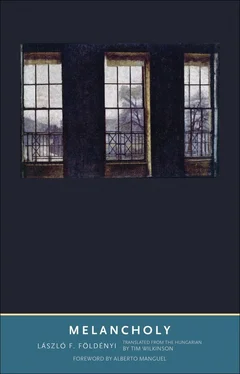( Werke und Briefe , 4:411)
This pain is pain in the literal sense of the word: suffering is still suffering when it is induced by psychological factors — indeed, it is all the more that. And it is perhaps in a state of pain that a person is least able to judge the world objectively, in abstraction. That was doubly true for the Romantics, who already suffered from the knowledge that there was no objective point of view — that “truth” did not exist — and immersion in the interior world did not even hold out the promise that from there an escape to somewhere was possible. At such times, one is like a hedgehog turned inside out: on the outside is raw flesh, all nerves, and on the inside the spines. The descent into an internal realm of thought is a
flight
from the world, from a lack of goals, and, of course, from poets and critics. In Schlegal’s words, “The dull person judges all other people like people but treats them like things, and is absolutely incapable of understanding that they are human beings distinct from himself” (
Lucinde and the Fragments
, 225). The descent into the interior is a
relinquishing
of the world, which fails to give answers to the most personal, ultimate questions. August von Platen notes in his diary about love and fondness: “Why do I have to be so deeply alive to it, if I cannot partake of it?” Although Goethe, with extraordinary sensitivity, found precisely love missing from Platen’s works, his attention did not extend to noticing that the “inner” repression and pain were negative imprints of an “external” world lacking in love and faith. (Two generations later, Theodor Storm, old but far from devoid of torments and “irresponsible” passions, noted in a letter: “I have a need of external limits and of scarcity so that inner perspectives open up to me” [
Briefe
, 2:227]). Descent into the interior was a
compulsion
, not an end in itself or an aesthetic
pleasure, as Hegel saw it: “This is a longing which will not let itself go in actual action and production, because it is frightened of being polluted by contact with finitude, although all the same it has a sense of deficiency of this abstraction” (
Lectures on Fine Art
, I. 3. A. 1. c). He was wrong. He argued on behalf of a reality that glorified activity and proclaimed finitude, failing to notice that action had long since hit back at the doer, that finitude was a constraint, and that the bourgeois world showed an entirely different face to the single individual than to the impenetrable armor of the absolute spirit. Descent into the interior was an unbearable compulsion, since one must experience day by day one’s continuous destruction. Novalis was prompted to inquire about the place of man in the universe by the death of Sophie von Kühn, his fifteen-year-old fiancée: “She alone tied me to life, to the Earth, to my activity. Due to her I broke with everything because now I no longer have even myself at my disposal,” he writes in one letter (
Ausgewählte Werke
, 1:xxxiii), and, a few months later: “The evening never passes, and soon it will be night” (1:xxxiv). It was no accident that his creative genius was practically liberated from the moment the girl died, and incandescent works marked the remaining traces of his short life. Depth and interiority: a release from the external world, which therefore allows its mysterious and otherworldly face to be glimpsed. Observing this is not granted to ordinary mortals. “Unutter’d harmony,” writes Emily Brontë in “The Prisoner,” “that I could never dream, till Earth was lost to me.”
Depth and interiority result in suffering (putting up with the “outside” world), but the works born out of this, the partial communicability of experiences that are approachable to some degree, remind us that we should notice not only the suffering in the lives and melancholic moods of the Romantics. One can suffer only from something, yet the object of the suffering, or more properly, its cause, is itself manifold. Since objects have more than one face and possess more than just one layer, suffering guarantees, for one thing, that ever more faces of the object may be seen and, for another thing, draws attention to the multifaceted nature of existence . (It is not at all an accident that ever since Romanticism, which made suffering a “state of the world,” a significant proportion of artworks owe their existence precisely to sensitivity, a discriminating sensibility derived from suffering.) One should relate in many diverse ways to something multifaceted. The much-talked-of irony of the Romantics, the ironic approach to the world, was a result of this duality. (Nothing seems more natural than the interweaving of irony and melancholia: it is a kinship that has been unbroken from antiquity to our day.) For on the one hand, the world hurts , but on the other hand, it is the world that hurts (those who are drowned in negativity and deny the world are also obliged to resign themselves to the world’s existence). This makes it possible for us to notice life even in death, pleasure in sin, enjoyment in suffering, health in sickness. Thinkers who apprehend the world in its prosaic one-sidedness naturally reject the possibility of identifying life with death, suffering with enjoyment. Nor can they do otherwise, since they see the world as a multiplicity of incomprehensible and senseless things in which they cannot discover the inner kinship of contradictory phenomena, only their mutually excluding antagonism.
Melancholic suffering caused by life becomes the basis of a new life. “We dream about travelling in space,” writes Novalis, “but is not the universe present inside us? We are unacquainted with the depths of our soul. The secret path leads inward. Nowhere else, just inside us, is eternity with its own worlds, past and present. The outside world is a mere shadow world which throws its shadows into the realm of light” (Novalis, Ausgewählte Werke , 3:7). The outlines of an internal landscape loom before the eyes of the melancholic, who becomes ever more remote from worldly matters, from tangible facts. This new world is not to be compared with anything— it seems that it is only through the creation of an internal world that man can become incomparable and unique, not through external action, which simply dissolves individual acts in an anonymous crowd . Kleist, whose torments were hardly commensurable with anyone else’s, wrote to his sister: “It is only within the world that it is painful; not outside of it” (Kleist, Werke und Briefe , 4:163). And it was also he who, winding up outside the world early on, lifted the pain of this exclusion up to the daylight of his consciousness and wrote as follows: “The future before me never looked so dark as now, though I never looked ahead more cheerfully than now” (ibid.). The forehead of this new outlook is marked by serenity: a serenity that is not a joke, not a jest, not at all a creation of will and decision, but a mental state. The serenity with which he looked ahead to a voluntarily accepted death manifested inner liberation, delight coupled with suffering, and a new way of looking at the world. In the farewell from life, which lasted up to the crack of the pistol, there was no trace of forcedness; after all, it was precisely such forcedness that he presumably was taking leave of. The same went for the rest. Tieck, a friend, described Novalis in the following way: “Just as in the course of conversation he most willingly disclosed the depths of his frame of mind and conversed enthusiastically about the regions of invisible worlds, so, at one and the same time, he was happy as a child, jested in an easy manner, and had his share in the high spirits of a gathering” (quoted in Novalis, Ausgewählte Werke , 1:xlii). He had an unclouded, serene death, or at least that was how it was seen by one eyewitness, Friedrich Schlegel, and it seemed that for him, his twenty-eight years meant just as full a life as eighty-three years did for Goethe. Wackenroder was fond of revelry; Körner went into battle happily and optimistically; Büchner was partial to farce; Burns, Shelley, and Byron were greedy for life; unrestrained good humor was a feature of Fohr until death claimed him at twenty-two years of age. Posterity, kitsch-creating memory, is fond of highlighting only the suffering in melancholia — a basis for that is given also by the contemporaneous remarks of Goethe and Hegel. The suffering of the Romantics was not affectation, however; rather, it derived from the sadness that (as Byron was fond of citing in his journal) generally characterized great geniuses, according to Aristotle’s observation. Melancholia, springing from the impossibility of imagined and craved happiness, was attended by pain as a matter of course (“All deep feelings are melancholic to some degree,” Thomas Mann noted), but since the suffering was caused by neither this nor that specific object, and gloom had its foundation in the temperament, the suffering therefore appeared in the melancholic’s relationship to things. This explained why happiness and good humor were not obstacles, for (perhaps under the influence of the daimon residing within us) who among us has not noticed the ludicrous futility of one’s own good humor; who, like the biblical King Solomon, has not looked at one’s own jollity from the outside? Naturally, not in the ordinary and superficial sense of self-criticism, but as a result of a kind of deeper amazement. In his journal, Byron records the following case: “People have wondered at the Melancholy which runs through my writings. Others have wondered at my personal gaiety; but I recollect once, after an hour, in which I had been sincerely and particularly gay, and rather brilliant, in company, my wife replying to me when I said (upon her remarking my high spirits) ‘and yet, Bell, I have been called and miscalled Melancholy you must have seen how falsely, frequently.’ ‘No, B.,’ (she answered) ‘it is not so: at heart you are the most melancholy of mankind, and often when apparently gayest’” (quoted in Letters and Journals , 4:73n1).
Читать дальше












